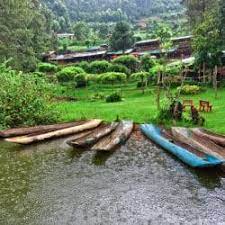Democratic Republic of Congo (Kinshasa)

The Democratic Republic of Congo (not to be confused with the Republic of Congo) has certainly one of the saddest histories in Africa. Second largest country on the continent and formerly named “Zaire”, the nation went through devastating decades during the reign of the auto-proclaimed head of state Mobutu Sese Seko. The country was then torn apart by bloody civil wars. Though conflicts are over nowadays, the Democratic Republic of Congo still has a long way to go to fully recover. Due to its history, the country is far from being a dream tourist destination. But it can offer a genuine African immersion to reckless adventurers.
HEALTH INFORMATION
We make every effort to ensure that the information posted on our website is up to date and accurate according to the latest public health recommendations; however, it is impossible for us to make changes on a daily basis.
For the most current travel health recommendations, please call our clinic as make an appointment with one of our travel health professionals.
DEMOCRATIC REPUBLIC OF CONGO (KINSHASA) – RECOMMENDED VACCINES
| Flu – Influenza | Seasonal influenza occurs worldwide. The flu season usually runs from November to April in the northern hemisphere, between April and October in the southern hemisphere and year round in the tropics. Influenza (flu) is caused by a virus spread from person to person through coughing and sneezing or by touching infected surfaces. Everyone 6 months and older should get a flu vaccine yearly. Vaccine is recommended 14 days prior to departure. |
| Hepatitis A | Recommended for all travelers. |
| Hepatitis B | Recommended for all travelers. |
| Causes, Symptoms & Treatment – Typhoid fever | Recommended for all travelers. |
| Tetanus – Diphteria – Pertussis Vaccine | Tetanus: In exceptional circumstances (eg, stay in a region where access to health care is limited), for a person aged 18 years or older, 1 dose of DT may be given if 5 years or more has elapsed since the last dose. Otherwise, one booster dose at the age of 50*. Pertussis (Whooping Cough): 1 dose is recommended for pregnant women, for every pregnancy, regardless of immunization history and the interval since the last dose (betwen week 26 and 32). *Only applicable for Quebec. |
| Measles – Rubella – Mumps | Two doses recommended for all travelers born after 1970, if not previously given. |
| The Yellow Fever Vaccine | A proof of vaccination against yellow fever may be required upon entry in to this country. Some travellers may not be eligible to receive this vaccine. Please enquire with your health care professional regarding your specific details. It is important to note that the vaccine should be administered at least 10 days prior to your departure. For further information, please consult with the World Health Organization (WHO) website: https://www.who.int/ith/ith- |
| Meningitis | Recommended for all travellers during the season(s). Consider immunization for specific groups or itineraries outside the dry season |
| Routine vaccines (dCaT, Polio, Meningococcal, Shingles, Pneumococcal, Hepatitis B, HPV, MMR & Varicella) | Recommended for all travelers |
| African Tick Bite Fever | Presence. All travellers should protect themselves against tick bites. |
| Transmission, Symptoms and Prevention – Rabies | For travelers at high risk of animal bites or being involved in activities with bats, dogs and other mammals. Clients who plan to visit remote areas may consider receiving this vaccine. Important to note the pre-exposure rabies vaccine is administered in 2 doses with one week interval between doses. Post-exposure vaccination is always recommended, even for those previously vaccinated. |
| Schistosomiasis | Avoid swimming in fresh water. |
| Turista – Traveler’s Diarrhea (ETEC) | Talk to your health care professional about the risks and precautionary measures to take, as well as the Dukoral® vaccine. Important to note that the Dukoral vaccine is an oral vaccine given in 2 doses, recommended at least 2 weeks prior to departure. |
| Malaria | Malaria is present in this country. The risk may be region specific. Prophylaxis measures to be discussed with the health care professional. |
| Polio | Polio vaccination is strongly recommended for travel to this region. A polio booster dose as an adult (>18 years old) is strongly recommended to travellers who have previously completed childhood polio vaccination. Proof of vaccination may be required for some travellers. |
| Cholera | Recommended for humanitarian workers, health care providers and/or adults who are traveling to areas of active cholera transmission. |
| Dengue Fever, Chikungunya and/or Zika | There are many illnesses that are transmitted via mosquito bites and unfortunately we do not have vaccines to protect us against most of them. It is important to inquire with your healthcare professional regarding the specific risks and the different illnesses presently in circulation. |
RECOMMENDED MEDICATIONS
| Antimalarials Recommended | Malarone, Doxycycline or Mefloquine |
| Antibiotics Traveler’s Diarrhea | Azithromycin or Suprax |
MEDICAL CARE
In the Democratic Republic of the Congo, the health care system remains very limited. Medical facilities are rudimentary in Kinshasa, and completely inadequate in the rest of the country. The best medical care you can expect is provided by the Private Emergency Center, located in the capital city. Emergency services are of acceptable quality in this establishment. In case of severe sickness or injury, an air evacuation to another country is required.
If you need an ambulance in the Democratic Republic of the Congo, you can call 20875 or 20876.
Medicines are rare in the country, even in the capital city. Be sure to bring enough essential drugs and all the specific treatments you could need when traveling to the country.
SECURITY ABROAD
The security situation in the DRC is unpredictable and could deteriorate suddenly.
CANADIAN EMBASSY
Emergency services
There is no centralized number to reach emergency services. Research and carry contact information for local police and medical facilities.
